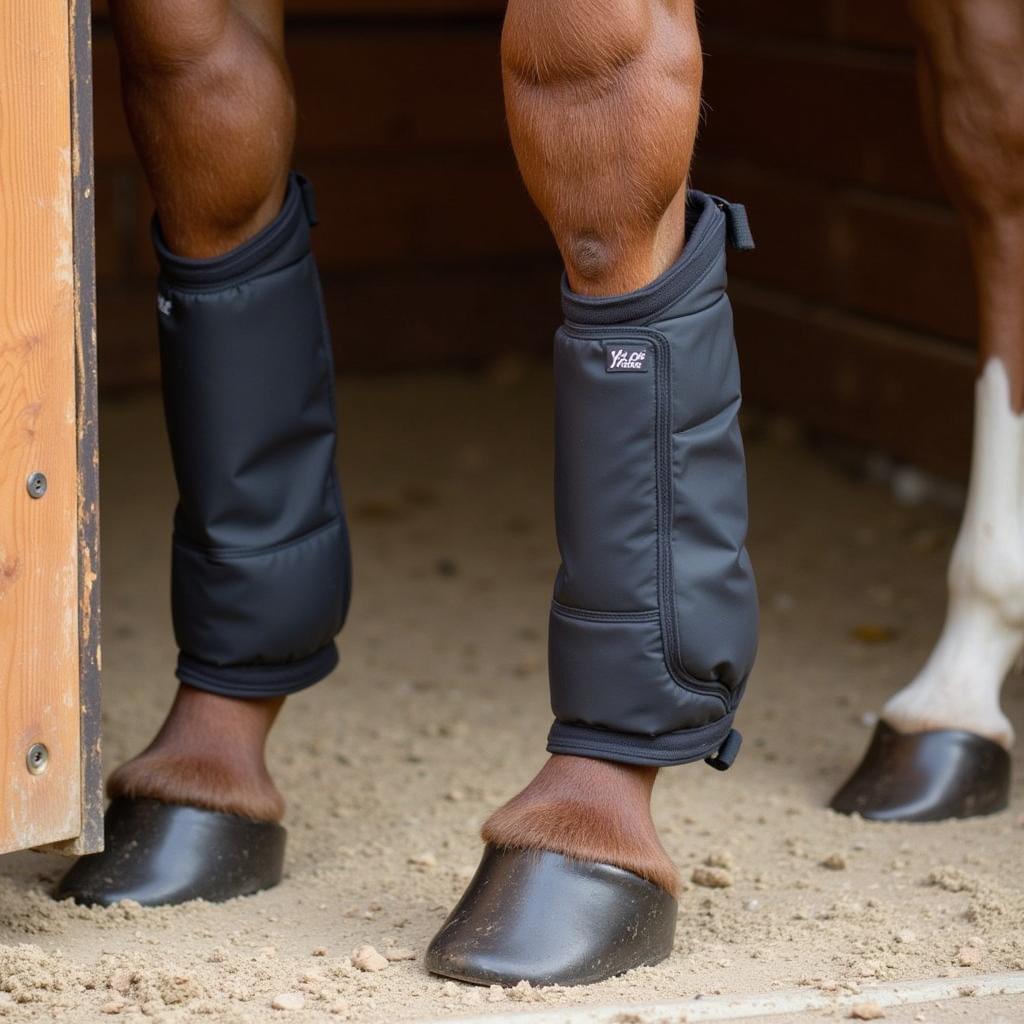Horses kicking each other is a serious concern for horse owners. This seemingly simple act can result in devastating injuries, ranging from minor bruises to broken bones and even fatalities. Understanding why horses kick is the first step in preventing these dangerous incidents.
One of the primary reasons for kicking is a defensive reaction. Horses are prey animals and their instinct is to flee or fight when they feel threatened. A kick can be a powerful deterrent against a perceived predator or even a dominant horse in the herd. This defensive behavior can be triggered by sudden movements, unfamiliar objects, loud noises, or even the presence of a new horse in their territory. Another common reason horses kick is due to pain or discomfort. A horse experiencing pain from an injury, illness, or poorly fitting tack may kick out reactively. It’s crucial to recognize the signs of pain in your horse, such as changes in behavior, gait, or appetite, and seek veterinary attention promptly.
Decoding the Language of Kicks: Types and Meanings
Horses use different types of kicks to communicate and defend themselves. Recognizing these kicks can help you understand the horse’s intent and prevent injuries. A single hind leg kick is often a warning or a defensive reaction. Double barreling, where the horse kicks out with both hind legs simultaneously, is a more aggressive and powerful defense. Front leg kicks, while less common, can also occur and are often directed at horses standing close by. Understanding the context of the kick, such as the horse’s body language and the surrounding environment, is essential in interpreting its meaning.
After providing regular farrier care, always observe your horse for any signs of discomfort or lameness. Regular hoof care is important for the horse’s overall well-being. You can learn more about a specific bone in the horse’s leg by visiting our article on horse tibia.
Managing Aggressive Kickers: Training and Prevention
Dealing with a horse that kicks requires a multi-faceted approach, including training, management, and environmental modifications. Training can help desensitize the horse to stimuli that trigger kicking and teach it alternative behaviors. This might involve gradually introducing the horse to new objects, sounds, and situations while rewarding calm and controlled responses. Consistent handling and ground work are essential in establishing respect and trust between the horse and handler. For horses that kick due to pain, addressing the underlying medical condition is paramount.
Managing a horse that kicks also involves implementing safety measures to protect both horses and handlers. This might include using kick chains or boots, separating aggressive horses from the herd, and providing ample space to minimize close contact. Environmental modifications, such as ensuring adequate pasture space, providing enriching activities to reduce boredom, and minimizing stressful situations, can also help reduce the likelihood of kicking incidents.
Are you interested in the Louisiana Downs Horse Racing Schedule for 2024? Check out our comprehensive guide to Louisiana Downs horse racing schedule 2024.
Why is My Horse Kicking at Other Horses?
Understanding the reasons behind your horse’s kicking behavior is crucial for effective management and prevention. Is your horse kicking out of fear, aggression, pain, or simply playfulness? Observe their body language, the surrounding environment, and any preceding events to determine the cause.
What are the warning signs before a horse kicks?
Before a horse kicks, it often displays warning signs such as pinned ears, a swishing tail, a tense body posture, and pawing the ground. Recognizing these signals can help you avoid a potentially dangerous situation.
How can I train my horse to stop kicking?
Training a horse to stop kicking involves a combination of desensitization, positive reinforcement, and consistent handling. Working with a qualified equine behaviorist can be invaluable in developing a tailored training plan.
 Horse wearing kick boots in a stall
Horse wearing kick boots in a stall
Conclusion
Horse Kicks Another Horse, a behavior with varied motivations ranging from defense and pain to social interaction. Understanding these nuances and implementing appropriate management strategies is essential for maintaining a safe and harmonious environment for both horses and humans. By observing your horse’s behavior, addressing underlying issues, and implementing preventative measures, you can significantly reduce the risk of kicking incidents and promote the wellbeing of your equine companions.
FAQ
- What should I do if my horse gets kicked?
- Can horses kick forwards?
- How far can a horse kick?
- Are some horse breeds more prone to kicking?
- How can I tell if my horse is in pain?
- What are the legal implications if my horse kicks someone?
- What type of protective gear can I use to prevent kick injuries?
For more information on horse health, you can check out our article on hock sores on horses. We also have resources available on topics such as horse neck sleazy and lymphatic blockage in horses belly. Contact us for assistance. Phone: 0772127271, Email: [email protected] or visit us at QGM2+WX2, Vị Trung, Vị Thuỷ, Hậu Giang, Việt Nam. Our customer service team is available 24/7.